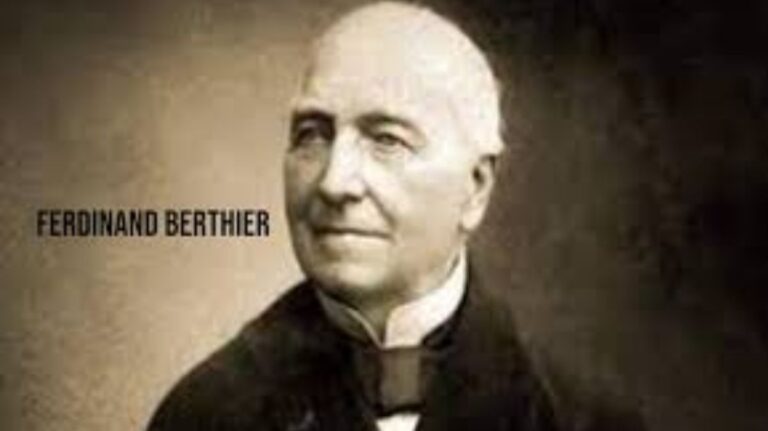Introduction to Ferdinand Berthier
Ferdinand Berthier was a prominent figure in the early 19th century, known for his military prowess and strategic mind. Yet, alongside his achievements, a question lingers: Was he deaf? This intriguing inquiry has sparked debates among historians and enthusiasts alike. Delving into Berthier’s life reveals layers of mystery about his hearing capabilities that continue to fascinate scholars today. Join us as we unravel the truth behind Ferdinand Berthier’s auditory history and explore how it intertwines with both personal narratives and broader societal perceptions of deafness in his time.
Historical Evidence of Deafness
Historical accounts of Ferdinand Berthier often hint at a complex relationship with hearing. Various documents from the 19th century describe him as having difficulty in communication, raising questions about his auditory abilities.
Some contemporaries noted that he relied heavily on visual cues during interactions. Letters and reports from that time suggest misunderstandings were common when discussing important matters.
Moreover, medical records provide intriguing insights. A few historians claim they reference treatments for ear-related ailments, implying potential deafness or significant hearing impairment.
However, these records are scattered and sometimes contradictory. The ambiguity surrounding Berthier’s condition invites speculation rather than definitive conclusions.
This lack of clarity continues to fuel discussions among scholars today, leaving us to ponder how much we truly know about Ferdinand Berthier’s hearing loss—or whether it even existed at all.
Controversial Claims and Theories
Ferdinand Berthier’s hearing has sparked various controversial claims within historical circles. Some historians argue that he was indeed deaf, citing anecdotal evidence and accounts from his contemporaries. These stories often paint a picture of Berthier struggling to communicate effectively.
Conversely, others vehemently dispute this notion. They point to military records and writings that suggest he had no significant hearing impairment during critical engagements. The conflicting narratives create an intriguing puzzle for researchers.
Some theories even propose that Berthier might have feigned deafness to gain sympathy or leverage in political situations. This speculation adds another layer of complexity to the discussion about his life and career.
The debate continues as scholars sift through limited documentation, striving for clarity amid differing interpretations of Berthier’s auditory abilities. Each theory sheds light on the enigmatic figure who played a pivotal role in military history.
Arguments for and against Deafness
Supporters of the theory that Ferdinand Berthier was deaf often cite historical documents. These texts suggest he faced communication challenges, hinting at significant hearing loss.
On the flip side, some historians argue against this view. They point to his active participation in various military campaigns and social events as evidence of normal hearing capabilities.
Critics also highlight potential biases among those who claim Berthier’s deafness. It’s suggested that personal beliefs may have influenced interpretations of historical records.
Additionally, many acknowledge that individuals can adapt remarkably well to their circumstances. If Berthier did experience hearing difficulties, he might have developed strategies to manage them effectively.
The debate remains complex and layered, reflecting broader discussions about disability in history and how narratives are shaped over time. Each argument offers a unique perspective on understanding Berthier’s life and contributions.
Modern Technology and Research on Berthier’s Hearing
Recent advancements in technology have opened new avenues for understanding historical figures like Ferdinand Berthier. Researchers are now utilizing audio analysis tools to explore the acoustic environments of his time.
These technologies allow scientists to recreate sounds from the early 19th century, providing insights into what Berthier may have heard or missed. By analyzing contemporary accounts and recordings, scholars can piece together a more accurate picture of his auditory experiences.
Additionally, studies in audiology contribute valuable information about potential hearing loss causes during that era. Such research helps contextualize Berthier’s life within broader societal attitudes toward disability.
Digital archives also enable easier access to primary sources related to Berthier’s life. Scholars can examine letters and documents for clues about his communication methods and interactions with peers, shedding light on how he navigated challenges associated with hearing loss.
Impact on the Deaf Community
Ferdinand Berthier’s story resonates deeply within the Deaf community. His experiences, whether he was deaf or not, highlight the challenges faced by individuals with hearing loss throughout history.
Many view him as a figure who may have navigated a world that often overlooked their needs. This brings attention to how society has historically marginalized people with disabilities.
Berthier’s legacy can inspire discussions on accessibility and inclusion today. His life invites questions about communication barriers and advocacy efforts for the Deaf community.
Moreover, his case encourages further exploration into historical figures’ hearing impairments. By examining these narratives, we shed light on cultural perceptions of deafness over time.
The ongoing dialogue sparked by Berthier’s situation fosters solidarity within the community. It emphasizes shared experiences while advocating for greater awareness and understanding in wider society.
Conclusion: The Truth Behind Ferdinand Berthier’s Hearing Loss
The quest to understand Ferdinand Berthier’s hearing loss remains a mix of historical intrigue and modern research. While some evidence suggests he might have been deaf, the interpretations of that evidence vary widely. Controversial claims and theories surrounding his condition only add to the mystery.
Arguments both for and against his deafness highlight the complexities in interpreting historical medical conditions. The advancements in technology have allowed researchers to analyze records more closely, yet they often yield inconclusive results.
For many within the deaf community, Berthier’s story resonates deeply. Whether or not he was truly deaf, his life illustrates broader themes about ability and perception during a transformative era in history.
Ferdinand Berthier’s legacy may ultimately serve as an important reminder: understanding individuals with disabilities is crucial—regardless of whether their stories fit neatly into one narrative or another.
